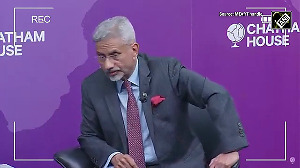How would US President Barack Obama reorient the country's policy towards Afghanistan and Pakistan?
In some measure, the logic behind the appointment of Richard Holbrooke, US special envoy to Afghanistan and Pakistan, was to address Pakistan's regional concerns, including its disputed borders, such as the Durand Line between Pakistan and Afghanistan and the LoC, among other regional issues.
It was intended to demonstrate to Pakistan that the US was sensitive to its regional concerns. If you take the Kashmir issue publicly out of the portfolio, the efficacy of this initiative in communicating concern for Pakistan's security is diminished. This is especially true because it is widely seen to have been removed from him due to effective Indian lobbying. With the current remit, he may work behind the scenes on Kashmir.
But a number of experts (Teresita Schaffer, Karl Inderfurth) have made explicit statements that Holbooke's brief does not include Kashmir.
India has to decide what kind of neighbour it wants. It has to figure out what type of Pakistan it wants and what policies it must have to achieve that objective. For a number of reasons, India should resolve its internal Kashmir issues not only due to Pakistan but due to its own domestic political concerns. However, I think it is important to note that regional issues are not the most important driver of Pakistan's behaviour in the region.
For this reason, I am sceptical that the Holbrooke effort will achieve the results that people are hoping for. Pakistan's fears of India are much greater than the border issues and the US has limited capability to make Pakistan feel less insecure.
Has Pakistan become a rentier state like Afghanistan since it has received $12 billion in aid in the past decade?
A rentier state is often defined as one whose expenditure up to 40 per cent is supported by an external power or other rentier income (oil, gas, etc). Afghanistan cannot collect enough domestic revenue to sustain its national defence or other government expenses, much less its development budget and recurring expenditures.
Pakistan doesn't meet these kinds of criteria for a rentier state. They are not comparable. But on the other hand, it is a rent-seeking state. It seeks rent based on its strategic importance for the US. And it has been successful in doing so in its six decades of existence.
How important is Iran in addressing the problem emanating from the Afghanistan-Pakistan border?
It's a question of choices. The Bush administration chose not to engage Iran. That was a strange choice considering that Iran played a positive role during the Bonn Process (that laid the foundation for rebuilding Afghanistan after the Taliban was ousted). What it got in return was inclusion in the "Axis of Evil."
A word on the recent RAND report on India's handling of the Mumbai terror attacks.
The report identifies that India's police have been very neglected in terms of training and equipment. Some of these police forces are deeply corrupt. India, like many countries, has problems communicating intelligence reports to the local police. The US has the same problem in terms of how the CIA communicates with the FBI and the FBI with police departments.
The difference is that America's neighbour is not a haven for terrorist organisations that can attack the US. The salience of the problem for India is much greater considering the neighbourhood it lives in. The RAND report has said that India needs to really focus on internal security.
What "best practices" can India borrow from the US to revamp the system?
The US and India, I am sure, do have a dialogue on these issues. Ultimately, it is a question of political will and resources. Many Indian interlocutors have explained to me that the Mumbai Police have certain notoriety for being corrupt. Yet, Mumbai is so important and needs high-quality metropolitan policing with support from a domestic investigative agency. And Mumbai needs good coastal security. But these changes are hard in a large bureaucracy. They are hard in the US system. Since policing is a state subject, reforming police forces is very difficult. Since it's about political will and political resources, India can choose to make internal security a priority like it made its nuclear programme a priority.
What's your reading of the various steps taken, such as the setting up of the NIA and amending laws?
India moved very quickly on legislation. Now, we have to see how it will be implemented. For example, there were many recommendations by the Kargil Review Committee, but how many have been implemented? Scepticism is warranted until action is seen. The Kargil Review Committee was very aggressive and came out with an effective analysis and excellent suggestions. But, correct me if I am wrong, very few recommendations were actually implemented. If you know your neighbour is going to be a source of terrorism or proxy war, as it has been since 1947, why would internal security not be a priority?
To be frank, India cannot do much to influence Pakistan's behaviour at this juncture. New Delhi does not have real military options that are game-changing and the options that do exist have huge risks. But the cost of inaction by India is also very high. Clearly, India does not have influence over Pakistan and given the current political and military configuration in Afghanistan, the international community, particularly the US, has limited influence over Pakistan. Depending on China's priorities, it could be roped in to influence Islamabad. All of this stresses the importance of strong defensive measures to protect the public from all sorts of internal and external threats.
How strident would the current administration be about multilateralism and about the reform of the UN Security Council?
Who doesn't swear by multilateralism, it's like apple pie and children. On UN Security Council reforms, there are many countries, such as Japan, that believe they are ahead of India in the queue. But as you know, the US is not in a position to dictate Security Council reforms.







 © 2025
© 2025